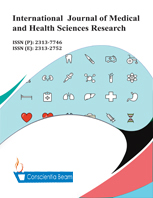Pharmacological and Non-Pharmacological Methods for Coping with Stress among Female Saudi University Undergraduates
DOI:
https://doi.org/10.18488/9.v9i1.2932Abstract
Exposure to stress among undergraduate university students, without enough coping methodologies might lead to deterioration in academic level and psychiatric complications. The current study aimed at evaluating the stress prevalence among the undergraduates of Princess Nourah University (PNU), assessing their level of awareness of symptoms indicating stress, and comparing the pharmacological coping methods with the non-pharmacological methods in terms of effectiveness in reducing stress. For this, a questionnaire was developed in Arabic, based on the Four-Dimensional Symptom Questionnaire (4DSQ) as a reference, measuring the prevalence of distress, depression, anxiety or somatization. In addition, various strategies of stress management were assessed. The response rate among the study subject was 97.7% (n=510). The prevalence of self-perception of being stressed was significantly higher in health colleges compared to non-health colleges. A significant number of the participants diagnosed as having somatization, anxiety, depression or distress were aware of the problem and have stress self-perception (P<0.001). Different chronic co-morbidities were correlated with stress self-perception, where diabetes had the highest significant effect. Alarmingly, the method most significantly used to cope with stress was taking medications. In conclusion, the prevalence of stress was high, especially among health colleges’ undergraduates. Most participants with stress self-perception used medications to cope with their stress. It is, thus, recommended that campaigns should be held among university students for raising the awareness of the dangers of persistent stress and the hazards of self-medication to cope with stress.

